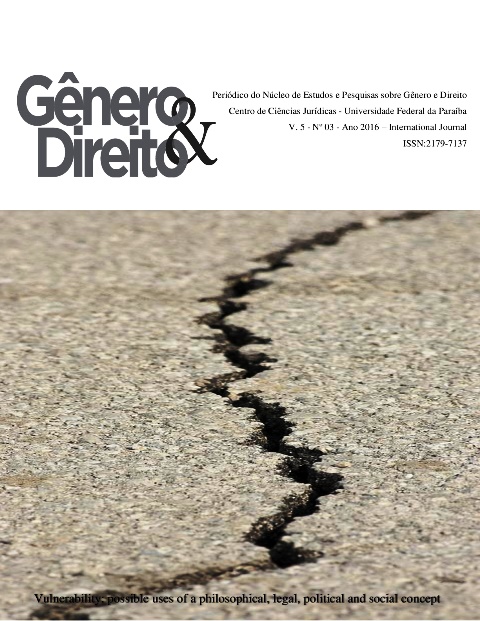CONCLUSIONS: VULNERABILITY AND STRENGTH: A TIMEWORN PAIRING IN NEED OF RECONSIDERATION
Palavras-chave:
vulnerability, force, equality, political and legal institutions foundationResumo
The notion of vulnerability is extremely broad and has been interpreted in a variety of ways by different disciplinary spheres. This multiplicity of meanings and usages certainly represents a resource and attests to the indisputable theoretical and practical relevance of this term and of the vocabulary that has developed around it. Reflections on vulnerability would acquire greater utility if they were aimed at reconfiguring the proposal-generating capacity of this notion, not so much with a view to replacing significant principles such as equality but rather by drawing attention to the fact that some existing political institutions and legal institutions are already implicitly based on vulnerability. In this case, the reflection would be directed at proposing a sort of overturning of the paradigm. Thanks to this alternative perspective, in fact, we would be able to recover the “classic” positioning of the notion of vulnerability: namely, a key element of political and legal thought by virtue of its being an intrinsic feature of all human beings and, as such, highly relevant for the establishment of political institutions and the production of legislation, which in turn makes it an implicit “assumption” in contractarian and utilitarian philosophies. This change in outlook would inescapably lead to a new re-consideration of the issue of violence/force from a contemporary perspective, and therein lies what I see as the true significance of vulnerability.Downloads
Referências
Arendt, Hannah (1970), On Violence, New York: Harcourt, Brace, Jovanovitch.
Barberis, Mauro (2011), Manuale di filosofia del diritto, Torino: Giappichelli.
Bobbio, Norberto (1994), Contributi ad un dizionario giuridico, Torino: Giappichelli
Bobbio, Norberto (1970), Studi per una teoria generale del diritto, Torino: Giappichelli.
Bobbio, Norberto (1999), Teoria generale della politica, Torino: Einaudi.
Butler, Judith (2004), Precarious Life: The Powers of Mourning and Violence, London and New York: Verso.
Butler, Judith (2006), Precarious Life. The Power of Mourning and Violence, London and New York: Verso.
Cavarero, Adriana (2007), Orrorismo. Ovvero della violenza sull’inerme, Milano: Feltrinelli.
Casadei, Thomas (ed.) (2012), Diritti umani e soggetti vulnerabili. Violazioni, trasformazioni, aporie, Torino: Giappichelli.
Ferrarese, Estelle (2016), “Vulnerability: A Concept with Which to Undo the World As It Is?”, Critical Horizons, 17, 2: 149-159.
Fineman, Martha A. (2008), “The Vulnerable Subject: Anchoring Equality in the Human Condition”, Yale Journal of Law & Feminism, 20: 1-23.
Fineman, Martha A. (2012), “Beyond Identities: The Limits of antidiscrimination An Approach to Equality”, Boston University Law Review, 92: 1713-1770.
Guaraldo, Olivia (2012), Comunità e vulnerabilità. Per una critica politica della violenza, Pisa: ETS.
Hart, Herbert L. (1994), The Concept of Law (1961), Oxford: Oxford University Press.
Kelsen, Hans (1990), La dottrina pura del diritto (1960), Torino: Einaudi.
Kelsen, Hans. (1966), Teoria generale del diritto e dello Stato, Milano: Etas.
Kirby, Peadar (2006), Vulnerability and Violence: the Impact of Globalisation, New York: Pluto Press.
Weber, Max (1946), “Politics as a Vocation”, in Weber, Essays in Sociology, Translated and edited by H.H. Gerth and C. Wright Mills, New York: Oxford University Press: 77-128.

